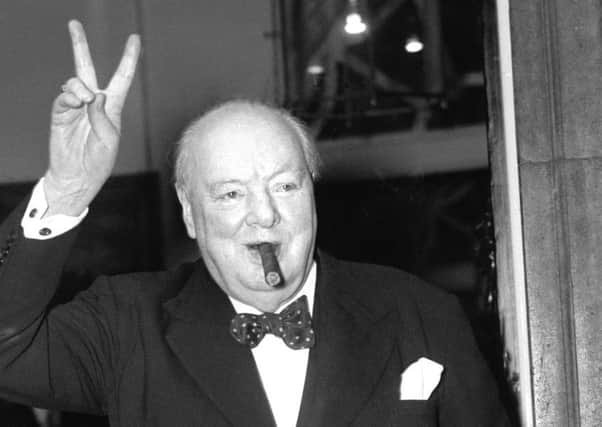Tom Richmond: Politicians should bridge party divide over Brexit


I’m referring to Brexit and the intransigence of those politicians, on all sides of Parliament, who are using the language of war with increasing – and perturbing – frequency.
This is nothing compared to the crisis brought about by the Second World War. If Winston Churchill could reconcile his considerable differences with his own party, never mind Labour, when he formed his war cabinet in 1940, it beggars belief that Theresa May and David Davis have not sought to reach out to others over Britain’s exit from the EU.
Advertisement
Hide AdAdvertisement
Hide AdIt’s all the more contrary – irresponsible – when set in the context of an illuminating book, Cabinet’s Finest Hour, written by (Lord) David Owen who became one of Britain’s youngest foreign secretaries when appointed in 1977 at the age of just 38.
Excuse my ignorance, but I didn’t realise that Ernest Bevin, for example, was not even an MP when he received the call from Churchill. He led the then Transport and General Workers’ Union, but impressed Churchill with his mastery of detail when it came to implementing the obscure-sounding Road Haulage Wages Act.
Lord Owen takes up the story: “Bevin was having to deal with the growing employment of women in roles previously occupied exclusively by men and tasked with negotiating the ‘rate for the job’.
“The fishing industry, hard hit by the Admiralty requisitioning trawlers for minesweeping and other naval duties, also demanded time and reorganisation.
Advertisement
Hide AdAdvertisement
Hide Ad“Bevin took the initiative in persuading five different Ministries, one of which was the Admiralty, to come together.
“Churchill agreed on October 19, 1939 to take the chair and Churchill and Bevin, brought into co-operation for the first time in their lives, rapidly took the measure of each other.
“There could hardly have been a greater contrast: the patrician politician, master of the suspect arts of war and diplomacy, and the working class leader, immersed in the social and industrial problems of trade unionism.”
When Churchill became PM, Ernest Bevin was foremost on the list of Labour politicians he wanted to serve alongside him in the Downing Street bunker.
Advertisement
Hide AdAdvertisement
Hide AdAfter appointing him Minister of Labour, a role exemplified by the formation of the Bevin Boys to work in the coal mines, and making sure Bevin was unopposed when the Wandsworth Central seat became available in a by-election, he wrote a letter of reassurance to the trade unions apologising for not being able to meet them personally to explain his rationale.
“The country’s needs are imperative, inescapable and imperious and we shall pay dearly if we fail to meet them. We can meet them now as a Government founded upon a new unity of national purpose,” he wrote.
Churchillian and statesmanlike words that are equally applicable to Brexit, don’t you think? For, while Churchill was a one-off, what about the politicians with Bevin-like qualities who are being excluded because their faces don’t fit?
SO Jeremy Corbyn is promising to fight for a Brexit settlement to protect jobs and living standards because he owes it to the young people who voted for Labour last month.
Advertisement
Hide AdAdvertisement
Hide AdHang on, isn’t this the same Mr Corbyn who went AWOL during the EU referendum when he could have been galvanising the youth vote that now lauds him as the nation’s supposed saviour?
If students had bothered to vote in the referendum, Britain would probably still be in the European Union – all the more reason to lament Labour’s opportunism.
COULD Theresa May be thrown an unlikely lifeline by Sir Vince Cable, the new Lib Dem leader?
Both were senior Cabinet Ministers in the 2010-15 coalition, and while Sir Vince’s politics are on the centre-left, he does know – as a former Business Secretary – that many of Jeremy Corbyn’s financial commitments are fanciful.
Advertisement
Hide AdAdvertisement
Hide AdDon’t rule the Lib Dems sitting out key economic votes (Brexit apart) if they believe it is not in the interests of the country for the Government to be brought down prematurely.
You could be forgiven for assuming Thursday was Groundhog Day as yet again our region was betrayed by government over infrastructure investment.
Barely six months ago the Transport Secretary looked Leeds business leaders in the eyes at a Chamber of Commerce dinner at the Royal Armouries, where he assured senior business executives – the loyalty of which his party depends – of his commitment to bridging the the north south divide.
Only, Mr Grayling appears to have no such intention as he scrapped plans to electrify a key rail route between London and Yorkshire at a stroke.
Advertisement
Hide AdAdvertisement
Hide AdNext time Mr Grayling comes to the Royal Armouries, Chamber President Gerald Jennings and his cohorts should ask the curator to load up the guns.
TALKING of transport, a horse racing acquaintance left himself four hours the other day to travel from Doncaster to the evening meeting at Haydock on the other side of the Pennines.
He only just made it – despite warnings from this correspondent that he was chancing his luck. “I thought the M25 and M4 were bad,” he lamented before his encounter with the M62. “Why do you put up with it?” Good question. One for our politicians to answer – if Ministers like the aforementioned John Hayes can be bothered.